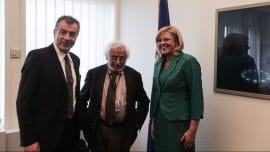Populism and fear favoured by policy inaction have helped xenophobia and racism flourish, according to Stavros Theodorakis, leader of the centre-left Potami party, who spoke to EurActiv.com in an exclusive interview.
Stavros Theodorakis is a former journalist and currently president of the Greek Potami party which is affiliated with the Socialists and Democrats (S&D) group in the European Parliament.
Theodorakis was interviewed by EurActiv Greece’s Editor-in-Chief, Sarantis Michalopoulos.
The last Eurogroup finally came to an agreement on Greece’s debt relief. Is this the light at the end of the tunnel for Greece?
The point is to break the tunnel rather than shed some light. After six years of crisis and 12 bailout reviews, Greeks want to stop seeing their life through a tunnel. However, this requires a plan and daring politicians, and Greece lacks both.
Let me insist. Is the Eurogroup decision a positive development for the country?
No one disagrees that the review had to be completed; but we have – once again – lost time and money. We lost a spring, and I am very much afraid that we will also lose autumn. The same will happen in the coming review in October. Incapacity to propose solutions has been apparent in all areas.
Guy Verhofstadt, the leader of the parliament’s liberal ALDE group, claimed that Memoranda of Understanding could not bear results in Greece, since “governments adopt measures but do not implement them”. Do you agree?
Guy said what everyone in Greece says. Horizontal cuts and increased taxes are not sufficient to lead a country out of the crisis. We need major reforms. But these threaten old-established political parties. The vast majority of the coalition government’s lawmakers (Syriza-Independent Greeks) are afraid by the word ‘reform’. For them, increasing VAT to 24% [from 23%] or adding some more to ENFIA (yearly property tax) has little importance; these are decisions of accountants, not of politicians.
What kind of reforms does Greece need? Liberal ones, such as those suggested by the ALDE leader, or leftist, as Tsipras has proclaimed?
What is considered a leftist reform? What Syriza brings in education is a step back, and similarly applies to the justice system. On top of it, they have assigned crucial roles to the party’s friends. Is this supposed to be a reform? Greece needs major reforms, which set as precondition a clash with the bad habits of the past.
The government, though, claims that it has restored longstanding injustices and transferred burdens from the poor to the rich people.
Just yesterday, it was revealed that the government decided to ‘pardon’ the ministers, parliamentarians and important state stakeholders who hold offshore companies. They also failed to cut excessive expenses as we have indicated; instead, they contributed to the state’s spending by adding 75 well-paid positions across ministries’ top posts. The reality is that we have the most wasteful political system and any other claim is ‘gold-plated leftist nonsense’.
However, do you agree that Greece needs political stability in order to implement the programme and attract investors?
You are right. Investments are of utmost importance. But, we don’t see them coming despite the decline of prices, wages, and values. Currently, investments add up to 10% of the Greek GDP while the EU average is 20%. Greece has to leave uncertainty behind and look for economic stability. However, this is impossible when the Syriza-led government adopts reforms and the next day, high-ranking lawmakers [of the government] claim that ‘what we voted is a crime’ and the taxes that we impose are ‘unfair’. Such an attitude equals to a call for tax evasion and a disincentive for citizens to contribute to public finances.
What are the next steps for your party? What will you change to restore your initial high rates?
The Potami party will continue to be a useful power, having in mind the country and not the polls. Most Greeks – many more than those who vote for us- recognize that we never mince our words. We didn’t compromise either. Obviously we made mistakes, but it could not have been otherwise. We are not professional politicians. We are 3,000 people throughout Greece who dare, collide, and recommend. We have neither advertising agencies nor funding. I hope all these will be recognized by the voters too. I would prefer in this life (laughs).
In a recent interview, you reiterated your proposal for a New Deal. Who do you address to? It is a call toward the leaders of other parties?
It is a proposal toward the Greek society. Unless there is a great deal among healthy forces of the economy, society, and culture, we will never get out of the crisis. Ten major changes and two years separate ‘gray Greece’ from the country that we want, a Greece that is worth delivering to our children. We just need to make a decision to cooperate putting aside both populists and backwards-thinkers.
The relocation of refugees is faced with reactions in many EU countries. How should Athens react taking into account that it has received the largest refugee wave?
Greeks hosted tens of thousands of refugees and migrants and this is something other peoples of Europe should not forget. Our common home is not only a monetary union but also a continent of solidarity and culture. Let’s all do our duty and set aside equivocation. Let’s prove that we are a truly united Europe and not an alliance just for the easy things.
Extreme-right parties are on the rise across Europe, with a recent example in Austria. Many claim that austerity-driven policies and the refugee crisis are to blame. What is your explanation?
Poverty does not make someone a far-right supporter. The absence of policy, the absence of decisions, and the lack of planning are to blame for creating fear in society. This results in populism that is widely spread on the Internet, social networks, in many of the new media and feeds xenophobia and racism.
So, when politics behind the scenes, inaction and populism dominate then extremists and conspiracy theorists roam. We are at this stage not only in Austria, but unfortunately also in Cyprus, and of course in Greece.
Photo credit: Theodore Manolopoulos






